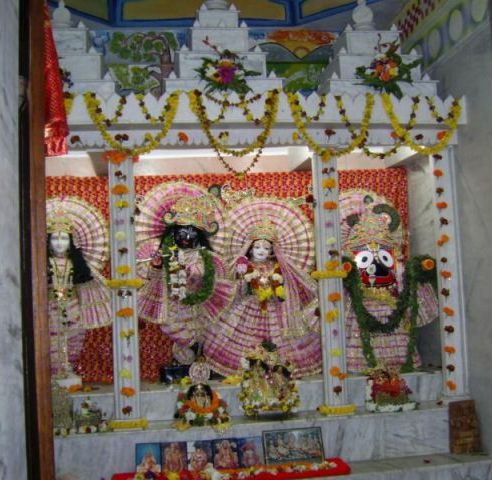 SRI CAITANYA MAHAPRABHU
SRI CAITANYA MAHAPRABHU
CHANTING THE HOLY NAME
Obeisance to You, O Lord, who yield the fruit of all actions and are omniscient or revealed in the form of Mantras. Salutations to You in the form of Shri Krishna, who is supreme virtue personified and is possessed of unobstructed wisdom, nay, who is the most ancient Person, the Lord of both Sankhya the path of knowledge and Yoga the path of Action. (from Bhagavata Purana "The hymn sung by Lord Shiva" )
satyam jnanam anantam
brahma-sivadi-stutam bhajad-rupam
govindam tam acintyam
hetum adosam namasyamah
Lord Govinda is the Supreme Brahman, the absolute transcendental reality. He is transcendental knowledge. He is the original cause of all causes. He is limitless and faultless. Lord Siva and all the demigods praise Him. The devotees worship His transcendental form. We offer our respectful obeisances unto Him. [source:Sri Vedanta-sutra, Introduction by Srila Baladeva Vidyabhusana]
19.We meditate on that pure, taintless, immortal and highest Reality which is
untouched by sorrow and by which (manifested in the form of Lord Narayana) was
graciously brought to light at the beginning of creation this matchless lamp of
wisdom to Brahma (the creator) and as Brahma to (the celestial sage) Narada, as
Narada to the sage Krishna (Vedavyasa) and as the latter to the sage Suka (the
prince among the Yogis) and in the form of Suka, to Pariksit (the favoured of
the Lord).
20.Hail to the celebrated Lord Vasudeva, the Witness (of all), who (for the
first time) taught this Bhagavata-Purana out of grace to Brahma, who was keen to
get liberated.
21.Hail to the sage Suka, that prince among the Yogis, the revealer of Brahma,
who redeemed King Pariksit (the favoured of Lord Vishnu), bitten by the serpent
in the form of (fear of) rebirth.
22.(Pray,) so ordain, O Ruler of the gods! that devotion to Your feet may sprout
(in my heart) in every birth (that I may have to take); for You are our
protector, O Lord!
23.I salute Sri Hari (the Dispeller of all fears and agony), the Supreme Lord,
the loud chanting of whose Names is the (most efficacious and easiest) way to
wipe out all sin and respectful salutation to whom alleviates (all) suffering.
[Thus ends the thirteenth discourse in Book Twelve of the great and glorious
Bhagavata-Purana, otherwise known as
the Paramahamsa-Samhita, composed by the sage Vedavyasa and consisting of
eighteen thousand Slokas.
(Rendered into English by C.L.Goswami, M.A.,Shastri)]
Kali-Santarana Upanishad
The Kali-Santarana
Upanishad is a Sanskrit text attached to the Krishna Yajurveda. It is a
minor Upanishad of Universal
Religion. The Upanishad was likely composed before about 1500 CE, and it was
popularized in the 16th century by Caitanya in the Gaudiya Vaishnavism
tradition. The short text presents two verses called the Maha-mantra, containing
the words ‘Hare’, ‘Krishna’ and ‘Rāma’. The word Hare or goddess
Radha is
repeated eight times, while the other two are Hindu gods Krishna and Rama who are repeated four
times. At the end of the
Dvapara Yuga sage Narada approached
Brahma and requested him to enlighten him on the path he should follow to
alleviate the detrimental effects of
Kali Yuga. Brahma said that by way of
taking the name of the supreme Lord
Narayana, all the
tribulations of Kali Yuga will be washed away. These sixteen names to be chanted
are as:
“Hare Krishna Hare
Krishna, Krishna Krishna
Hare Hare,
Hare Rama Hare Rama,
Rama Rama Hare Hare .”

Chanting of the sixteen word mantra is asserted by the text to be constantly
done by sage Narada, who with his musical
instrument tanpura has been doing it for ages. Apart from this Upanishad,
chanting of this mantra has also been prescribed in
Puranas such as
Brahmananda
Purana, the
Agni Purana and so forth. In modern times, Lord Chaitanya who is
believed to be the incarnation of Lord Krishna also preached chanting of this
mantra. It should be chanted always
irrespective of whether one is in a pure or impure condition. [ source: Aiyar, K. Narayanasvami. "Kali Santarana Upanishad". Vedanta
Spiritual Library. Retrieved 1 January 2016.]
More about Hare Krishna Maha Mantra chanting.PDF
Explanation of Maha Mantra acording A. C. Bhaktivedanta Swami Prabhupada
Read more about A. C. Bhaktivedanta Swami Prabhupada
How did brahmana Ajamila escaped from the jaws of Death
Molitev ki jo je odpel Gospod Šiva (in
Slovenian language)
